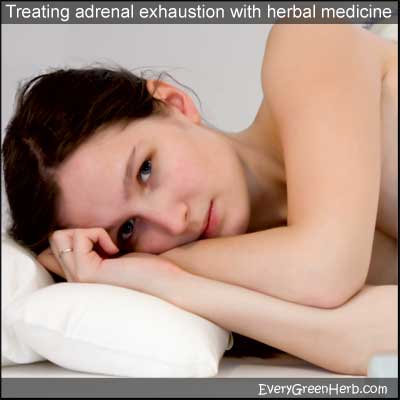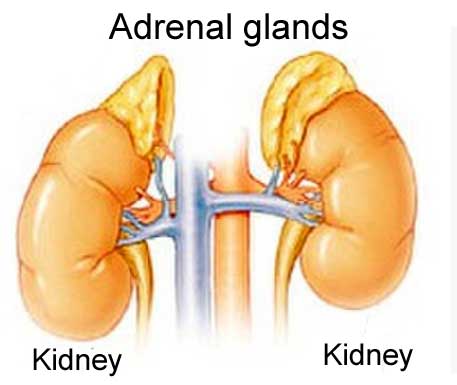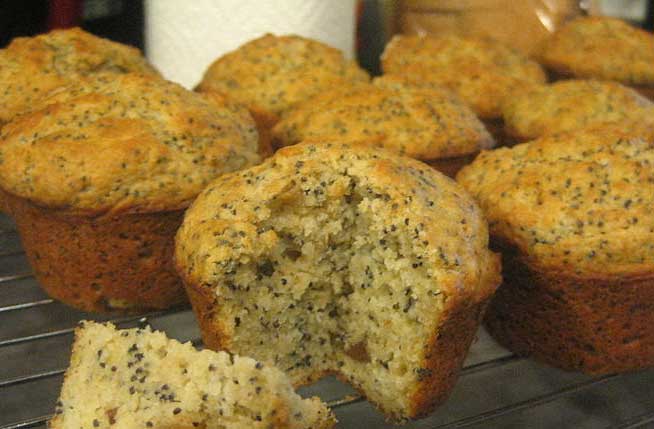The endocrine glands
The endocrine glands are a complex network of glands and organs that use hormones to control metabolism, energy levels, reproduction, growth, response to stressful situations, mood, and more.

If you are tired and irritable most of the time, you might benefit from building up your adrenal glands with good diet and herbal remedies.
Herbal remedies for the endocrine glands
When one of the endocrine glands gets out of whack, all kinds of symptoms appear. Don't wait until your glands are exhausted! Instead, eat a good diet and nourish your endocrine system with herbs. Many common herbs like burdock and flax seeds can really help to keep your glands healthy.
The endocrine system includes:
- The hypothalamus, located at the base of the brain, secretes hormones to regulate the pituitary gland. The hypothalamus also controls water balance, sleep, temperature, appetite, and blood pressure.
- The pineal body, located in the middle of the brain, produces the hormone melatonin, which helps the body know when to sleep.
- The pituitary, located below the brain and the size of a pea, controls many functions of the other endocrine glands.
- The thyroid, located in front of the neck, plays an important role in the body's metabolism and calcium balance.
- The parathyroids, attached to the thyroid, regulate the thyroid and minerals in the body.
- The thymus, located in the upper part of the chest, produces white blood cells that fight infections and destroy abnormal cells.
- The adrenal glands, located on top of each kidney, work hand-in-hand with the hypothalamus and pituitary gland. The adrenal glands make and release corticosteroid hormones and epinephrine that maintain blood pressure and regulate metabolism.
- The pancreas, located across the back of the abdomen, behind the stomach. The pancreas plays a role in digestion, as well as hormone production. Hormones produced by the pancreas include insulin and glucagon, which regulate levels of blood sugar.
- The ovaries (in females) are located on both sides of the uterus, below the opening of the fallopian tubes. In addition to containing the egg cells necessary for reproduction, the ovaries also produce estrogen and progesterone.
- The testis (in males), located in a pouch that hangs suspended outside the male body, produce testosterone and sperm.
We have nine endocrine glands, including the ones in the brain. Endocrine glands are glands that secrete hormones directly into the blood instead of through a duct. Humans have lots of different types of glands but I want to concentrate on three of the endocrine glands.
The adrenal glands, the thyroid gland, and the parathyroid glands
For now, let’s get to know the three endocrine glands that occupy our upper torso and neck - the adrenals, the thyroid, and the parathyroids.
The adrenals, sitting on top of the kidneys, the thyroid in our neck, and the parathyroid glands on the thyroid, regulate everything from energy levels to heartbeat. When one of them goes haywire, producing too many or too few hormones, the body, mind, and spirit can be affected in negative ways.
Thank goodness medicinal herbs and lifestyle changes can help!

The adrenal glands
The adrenals are pyramid shaped endocrine glands that sit on top of the kidneys. They are responsible for regulating stress response in the body by producing and delivering hormones.
The adrenal hormones are directly related to metabolism, balance, energy levels, memory, circulation, blood pressure, sex drive, and immunity.
The hormone adrenaline controls response to stress.
One well-known hormone produced by the adrenal glands is adrenaline which controls our response to stress. Adrenaline produces acceleration of heart and lung action, stops stomach and digestion activity, constricts and dilates blood vessels, dilates the pupils, relaxes the bladder, and inhibits erection. It readies the body for "fight or flight."
Sugar can weaken the adrenal glands.
In modern day times, stress hormones build to excessive levels. Busy lives, bad diet, negative emotions, and limited physical exercise can lead to adrenal exhaustion, adrenal atrophy, and Addison's disease.
Adrenal glands are also weakened by refined carbohydrates, sugars, and too many stimulants including caffeine.
Flax seeds are good for the adrenal glands.
Adrenal glands can benefit from a low-salt diet that is rich in vitamins B, E, A, and C. Flax seed, bran, oatmeal, brewer's yeast, wheat-germ, fresh fruit, and fresh vegetables should be eaten regularly.
Adding zinc, selenium, potassium, manganese, germanium, and magnesium supplements may also be beneficial for all of the endocrine glands.
Herbs for the adrenals include royal jelly and ginseng.
If adrenal exhaustion is suspected, royal jelly (from honeybees) and ginseng can help.
Other home remedies include daily consumption of evening primrose, hawthorn, or licorice tea.
Other herbs for the adrenals include milk thistle seed.
Medicinal herbs for adrenal health include echinacea root, and milk thistle seed. These may be taken as powder, tea, or tincture.
Warm compresses applied to the lower back may bring relief to the adrenals. If adrenal exhaustion is diagnosed, licorice extract taken under the tongue twice a day is an option. Licorice should only be used for two weeks so don't overdo it.
Adrenal exhaustion can cause changes in skin color.
The main symptom of adrenal exhaustion is an inability to cope with stress. There may be other signs such as anorexia, unexplained weight loss, nausea, dehydration due to vomiting and diarrhea, low blood-sugar, apathy, and development of black freckles on the head and shoulders.
Sometimes abnormal dark brownish pigmentation appears on the skin, particularly on the knees, elbows, palms, nails, gums, and skin folds.
Adrenal exhaustion is associated with hypothyroidism.
The adrenal glands work with the thyroid to regulate everything from stress response to energy metabolism. Since the thyroid and other glands work with the adrenals to regulate the body, things can get out of whack quickly. When one gland gets out of sync, the other glands are also affected.
Symptoms of glandular problems include lack of energy, dullness, increased anxiety, poor circulation, memory problems, low blood-pressure, moodiness, sugar dysfunctions, brittle nails, back pain, muscle spasms, insomnia, thinning hair, and sugar or salt cravings.
Other symptoms of adrenal problems
Blonde hair may darken, body hair may decrease, and the person may feel cold. Many of the symptoms with adrenal exhaustion mimic thyroid dysfunction.
In advanced cases there may be a sudden loss of strength, severe abdominal pain, and kidney failure. If adrenal exhaustion becomes extreme, the adrenals may shrink.
In some cases this leads to Addison's disease which is also associated with hypothyroidism.

Blood tests can show if our endocrine glands are producing enough hormones.
More about the adrenal glands
This video covers the adrenal glands and the hormones they produce. If you have serious adrenal problems, learn all you can before deciding on a treatment plan. Read, watch videos, and ask your healthcare professional about all the options.
The thyroid
The thyroid is a butterfly shaped gland located in the front of the neck. It is responsible for many functions including metabolism, growth, and body temperature.
The thyroid secretes hormones that are responsible for everything from hair growth and sleep patterns to proper digestion and cholesterol production. If you have thyroid problems, herbal remedies and exercise can help!
Herbs for treating the thyroid
Medicinal herbs that support thyroid health include oat straw, horsetail, raspberry leaf, blackberry leaf, alfalfa, burdock root, parsley, yarrow, ginger, echinacea, licorice, evening primrose oil, nettle, and ginseng.
- Herbs especially suited for under active thyroid include hawthorn and bladderwrack.
- Herbs especially suited for overactive thyroid include lemon balm, motherwort, mullein, and bugleweed.
Wheat grass and the thyroid
Wheat grass, a great natural remedy for many health problems, helps regulate the thyroid. People with hypothyroidism or hyperthyroidism, should take wheat grass on a regular basis.
Use wheat grass fresh or in dried-powder form. Add wheat grass to smoothies and fruit juices. The body will feel energized almost immediately.
Wheat grass really helps! I know from personal experience that a wheat grass smoothie can help energize a sluggish thyroid. I grow wheat just for this purpose.
It's easy. Just plant the seeds and harvest often. I use a blender and add a handful of grass to a cup of juice and maybe some lemon and honey.
It tastes good after you get used to it. In fact, I crave it in times of stress. Read more about live enzymes and the benefits of green drinks.

Exercise is very beneficial to the lymphatic system and thyroid health.
Try to exercise at least thirty minutes every day if you have thyroid problems. Exercise helps the thyroid and all organs of the body by getting the lymphatic system flowing.
The lymphatic system gets rid of bad stuff including toxins from the body. The blood has the heart for a pump, but the lymph system depends on exercise to work properly.
- Swimming is the perfect exercise for anyone with aching joints.
- Running may work for others.
- Walking is also a good choice. Just a fifteen minute walk every day can make a world of difference in thyroid health.
- Try different types of exercise including weight lifting which is good for everyone, not just people with thyroid conditions.
- Variety is better than sticking to one routine. Get up and move to keep your thyroid healthy!
Symptoms of thyroid disorder
When something goes wrong with the thyroid, symptoms can include fatigue, depression, sensitivity to cold, heart palpitations, development of a goiter, weight gain, weight loss, insomnia, thinning hair, thinning eyebrows, changes in heart rate, vision problems, brittle nails, itchy skin, headaches, low blood pressure, hoarseness, constipation, and diarrhea.
If thyroid problems are suspected, a blood test can determine if the thyroid gland is producing too many or too few hormones.
Diagnoses include hyperthyroidism which means the thyroid is producing too many hormones and hypothyroidism which means the thyroid is not producing enough hormones. Both hyperthyroidism and hypothyroidism usually require that prescription medicines be taken for the rest of one's life.
Other diseases of the thyroid include goiter, Hashimoto's disease, and Grave's Disease.

Good diet for the thyroid
To keep the thyroid healthy, a nutritious diet is very important. Iodine, magnesium, and other minerals are necessary for thyroid health.
Make sure to eat leafy greens, nuts, seeds, apricots, broccoli, cauliflower, sea vegetables, and seafood regularly.
Black walnuts are especially good for the thyroid. Avoid peanuts, soy beans, caffeine, white bread, processed foods, fried foods, sugar, and alcoholic beverages.
Essential oils for the thyroid
Gently massaging the neck can also help improve thyroid health. Use a herbal massage oil blend of grape seed oil, St. John's wort oil, and geranium essential oil for best results.
The thyroid and Chinese medicine
The Chinese believe that thyroid problems stem from emotional upsets like anger and sorrow. Their traditional herbalists use many different medicinal herbs including oyster shell, turtle shell, gardenia, and peony root to treat the thyroid. Acupuncture therapy is also used for thyroid problems.

The parathyroid glands
Although their names are similar, the thyroid and parathyroid glands are completely different. The four parathyroids are the size of grains of rice or small peas and sit on the surface of the larger thyroid gland in the neck.
The parathyroid glands balance minerals in our blood especially calcium and phosphorous. They also have a lot to do with regulating the thyroid. When hyperthyroid or hypothyroid is diagnosed, malfunctioning parathyroids are often the cause.
The hormones released by the parathyroid glands cause the bones to release calcium into the blood. The parathyroid hormones also regulate kidney function causing kidneys to store more calcium instead of releasing it from the body via urine. Proper calcium balance is crucial to the normal functioning of the heart, nervous system, kidneys, and bones.
A good way to keep the parathyroid gland healthy is to get plenty of vitamin D. Ten minutes of morning sunshine can really help your body to increase its level of vitamin D, so make time for sitting in the sun at least a few minutes every day when weather is nice.
*Always consult with a healthcare professional before using any herbal remedies especially if taking prescription medications, pregnant, nursing, or under the age of eighteen.
Sources:
https://www.hopkinsmedicine.org/health/wellness-and-prevention/anatomy-of-the-endocrine-system
Blessings to you and yours!
Thanks so much for reading my blog. Jan.

*Note - the information on this website has not been evaluated by the Food and Drug Administration.
© 2005-2024 website design and content by Janice Boling